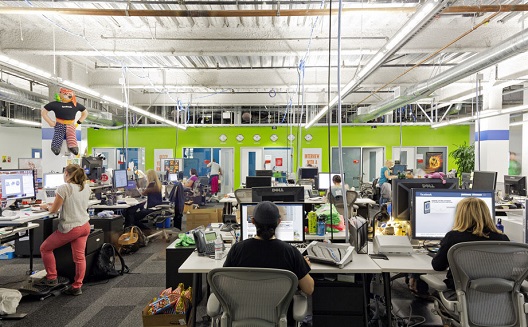A day in the life of a Facebook programmer

Facebook is one of the world’s most successful startups and - as for many tech startups - programmers are the bedrock of its success.
Wamda doesn’t usually highlight programmers, but today we have a very special occasion for that: it’s September 13 and International Programmer’s Day!

So we have an ode to all the programmers out there, working behind the scenes of every tech startup out there, squishing bugs, pushing code and turning dreams into reality.
Lebanese developer Ziad Traboulsi (right) is a lead software engineer at Facebook's Dublin office. He's been working there for the past five years and is currently involved with Internet.org, a Facebook-led global partnership dedicated to making affordable internet access available to the two-thirds of the world not yet connected.
Traboulsi is also an entrepreneur, cofounding a company in 2001 at the age of 13: it was an online portal featuring news, reviews, discussion forums and selling apps for PocketPC and Palm OS.
After having a couple of fun tech- and startup- related chats with Traboulsi, we thought we’d ask him how a typical day of a software engineer at Facebook would go.
8:00am: Waking-up at flexible hours is one of the great perks of working for Facebook! I typically spend about twenty minutes catching up on everything that happened in the company and the industry during my sleep. This exercise is quite important as Facebook is a 24/7 machine and that most of my colleagues work in Silicon Valley where it’s still daytime, while I’m asleep.
I also write down the top things I want to achieve during the day, however big or small they can be, and check out TechCrunch as well as some telecom-related news outlets.
9:30am: I bike to work, eat breakfast at my desk from our free restaurant - one of the other great benefits that Facebook offers its employees.
10:00am: I spend a bit of time reviewing code and answering any pressing emails from external partners and my team, to make sure I’m not being a bottleneck for everyone and so I can keep things flowing nicely. After that, I usually dedicate time to coding, at least a good hour non-stop.
It’s very important for me to be completely in the zone and focused on the task at hand. It takes a bit of time to get in the zone when writing code, so I always make sure I have enough time to at least make solid progress on what I’m doing. Going in and out of ‘the zone’ is a waste of time, so limiting this is a must.
I usually put on my headphones when I start coding. We have an informal policy at Facebook whereby having your headphones on means that you should not be disturbed. This really helps me stay in the zone while I code.
My development machine is a Lenovo 450s with a simple set of tools consisting of Putty, Mosh, tmux, and Vim.
I work with operators in the EMEA region to facilitate the launch of Internet.org on their networks. This involves makings changes on both the operators’ side and Facebook’s in order to integrate the systems. I also manage our internal development to make deployments easier.

Most people check Facebook at work, Traboulsi works at Facebook... and gets a check. Facebook's Dublin HQ. (Image via Facebook)
12:30pm: Quick lunch, sometimes at my desk.
2:00pm: I would typically have one or two interviews conducted in the afternoon. Facebook’s always hiring!
3:00pm: Mixture between some more coding or thinking about architecture and infrastructure problems.
Part of the Internet.org intiative aims to solve one of technology’s most difficult problems: how to bring everyone online and make connectivity truly ubiquitous.
There are significant infrastructural and socio-economic problems standing in the way to achieving this goal. For instance, 20 percent of the planet’s population isn’t within easy access of even a cellular network, and a large part of those who can connect do it over very expensive yet terribly slow and unreliable connections. Our aim is to solve this by making the internet more accessible and by investing in technologies that make it easier and cheaper for people to connect.
4:00pm – onwards: A bunch of meetings, mainly with our engineering teams in California.
Facebook updates its products with new features, improvements, and bug fixes several times every work day. This can sometimes be a huge challenge, given that there are thousands of engineers working on tens of thousands of changes every week, and many of those changes immediately impact the over 1.4 billion people that come to the site every month. “Moving fast” is one of the key procedures that enable Facebook to keep an edge and have a fast, iterative process.
Are you passionate about programming and web development? We’re offering an opportunity to be part of an awesome team at Wamda. You’ll need to be proactive and willing to hit the ground running. In return, you’ll be working on rewarding projects that are set to shake up the entrepreneurial industry in the MENA region.
If interested, send us your CV to joinus@wamda.com.

